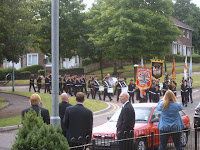...Northern Ireland*.
Most American readers will only know Northern Ireland as a "trouble spot" similar to Beirut, Gaza or East Jerusalem. Many will also know that the peace accords of 1997 have helped to bring Northern Ireland, or Norn Iron, as the Scotch-Irish dialect pronounces it, from the brink of civil war to a well-deserved peace.
As a member of an American Orange Lodge (a growing movement in the U.S. and Canada) I went with members of our lodge and our Canadian brothers to meet with our Ulster brothers and walk with them on their Big Day.
 An Orange 12th of July parade is very much like a U.S. 4th of July parade. There is plenty of colour (orange) and red-white-and blue. Many of the same tunes are played - “Green Banks of the Boyne” is played to the same tune as “Columbia, the Gem of the Ocean”. There are fireworks that night while bands play patriotic tunes.
An Orange 12th of July parade is very much like a U.S. 4th of July parade. There is plenty of colour (orange) and red-white-and blue. Many of the same tunes are played - “Green Banks of the Boyne” is played to the same tune as “Columbia, the Gem of the Ocean”. There are fireworks that night while bands play patriotic tunes.Over all, an Orange march also equally encompasses the religious element – we are Protestants, and we are proud to show it.
Of course, there are naysayers. Because the Orange Order is pro-protestant, it is accused of being anti-catholic. It’s a wonder that no-one thinks to use the same argument to accuse the Roman Catholic Church, since it is pro-Catholic, of being anti-protestant. It was Pope Benedict who (as Cardinal Ratzinger) said that Anglicanism wasn’t a legitimate church. We Protestants just smile at the Pope saying another popish thing. What’s a few martyrs between estranged brothers and sisters, anyway.
Orangemen are charged by their Order to speak kindly and lovingly to our estranged Romanist brethren. Love the sinner; hate the sin, and all. Even when they are playing the Victim Game.
A typical morning of the 12th seems to go thus: Up at 6:00 AM to shower, shave and put on your Sunday Best (a dark suit, navy or black is the rule. Many Orangemen breach this and wear light sports jackets/blazers.) Note that a march is NEVER held on the Sabbath out of respect for the Lord’s Day.
 After a quick cup of tea, it’s a quick walk to the lodge meeting point. Each lodge usually meets at the master’s or deputy master’s house. There, the whole family turns out to help with breakfast – sandwiches; bacon and egg, sausage, kippered herring, and lots of tea. If the house or back yard allotment is large enough, a short meeting for prayer and repetition of the Orange Principles is held.
After a quick cup of tea, it’s a quick walk to the lodge meeting point. Each lodge usually meets at the master’s or deputy master’s house. There, the whole family turns out to help with breakfast – sandwiches; bacon and egg, sausage, kippered herring, and lots of tea. If the house or back yard allotment is large enough, a short meeting for prayer and repetition of the Orange Principles is held.It is a sobering and humbling event to stand in fellowship in the early morning quiet and pray the Lord’s Prayer with several dozen of your brothers. There is not a hint of jingoism, nor even, in that moment, patriotism. There is just Faith, simple and reformed.
Of course, we are surround outside by red-white-and-blue bunting, and the flags of the United Kingdom and Northern Ireland are prominently displayed, along with the Canadian and American flags.

Soon, the hired band will arrive, playing a merry march. Another round of sausage and egg sandwiches for the bandsmen (and any brother who feels the need for extra fortification) and then you’re off to the march off point.
To be continued…
* I know I wrote that Norn Iron is probably the last place where Protestants march is witness - really, they do so in Scotland and England as well. And soon - the United States. Stay tuned.

